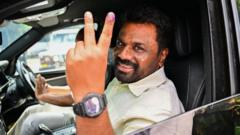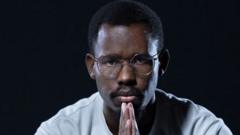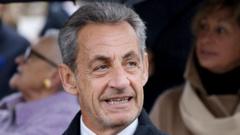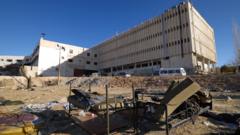In the partial results of the snap elections, Anura Kumara Dissanayake's National People's Power (NPP) coalition has emerged as a significant contender, winning 97 seats and over 60% of the vote. As the political landscape of Sri Lanka shifts, Dissanayake’s administration aims to secure a majority in the 225-member parliament to fulfill campaign pledges focused on combating corruption and stabilizing the economy after a tumultuous period.
Sri Lanka's National People's Power Coalition Takes Lead in Snap Elections

Sri Lanka's National People's Power Coalition Takes Lead in Snap Elections
Sri Lanka's new presidential coalition, led by Anura Kumara Dissanayake, is poised for a substantial victory in recent snap parliamentary elections, promising to address economic challenges.
In the wake of Sri Lanka's severe economic crisis, Dissanayake’s election in September was fueled by public concern over high living costs. Analysts are keen to see if the NPP can achieve a two-thirds majority allowing for expansive reforms. Following an electoral strategy shift, nearly two-thirds of former parliament members, including key figures from the former ruling Rajapaksa dynasty, opted not to seek re-election, creating room for fresh leadership within the assembly.
Dissanayake expressed the significance of this election, stating, “We believe that this is a crucial election that will mark a turning point in Sri Lanka,” after participating in the voting process. He highlighted the need for a parliament reflective of the people's will, questioning the viability of the previous assembly.
In the context of political turbulence, successive administrations have struggled amidst economic hardship, leading to growing discontent among citizens regarding inflation and scarcity of essential items. Dissanayake's platform, rooted in strong state intervention and leftist economic policies, has resonated with voters seeking alternatives to the established political order.
Despite his less-than-50% electoral success as president, many predict improved results for his coalition. This election also reveals fragmentation within the opposition, resulting in a weakened traditional political stance, and facilitates the rise of Dissanayake’s vibrant campaign to garner support.
Regardless of the final outcome, the new government will face immediate pressure to deliver on promises and navigate Sri Lanka's economic complexities, with a must-do focus on alleviating the pressing needs of an impoverished populace. The road ahead will challenge the new leadership to turn promises into tangible outcomes amidst ongoing economic distress.
Dissanayake expressed the significance of this election, stating, “We believe that this is a crucial election that will mark a turning point in Sri Lanka,” after participating in the voting process. He highlighted the need for a parliament reflective of the people's will, questioning the viability of the previous assembly.
In the context of political turbulence, successive administrations have struggled amidst economic hardship, leading to growing discontent among citizens regarding inflation and scarcity of essential items. Dissanayake's platform, rooted in strong state intervention and leftist economic policies, has resonated with voters seeking alternatives to the established political order.
Despite his less-than-50% electoral success as president, many predict improved results for his coalition. This election also reveals fragmentation within the opposition, resulting in a weakened traditional political stance, and facilitates the rise of Dissanayake’s vibrant campaign to garner support.
Regardless of the final outcome, the new government will face immediate pressure to deliver on promises and navigate Sri Lanka's economic complexities, with a must-do focus on alleviating the pressing needs of an impoverished populace. The road ahead will challenge the new leadership to turn promises into tangible outcomes amidst ongoing economic distress.






















